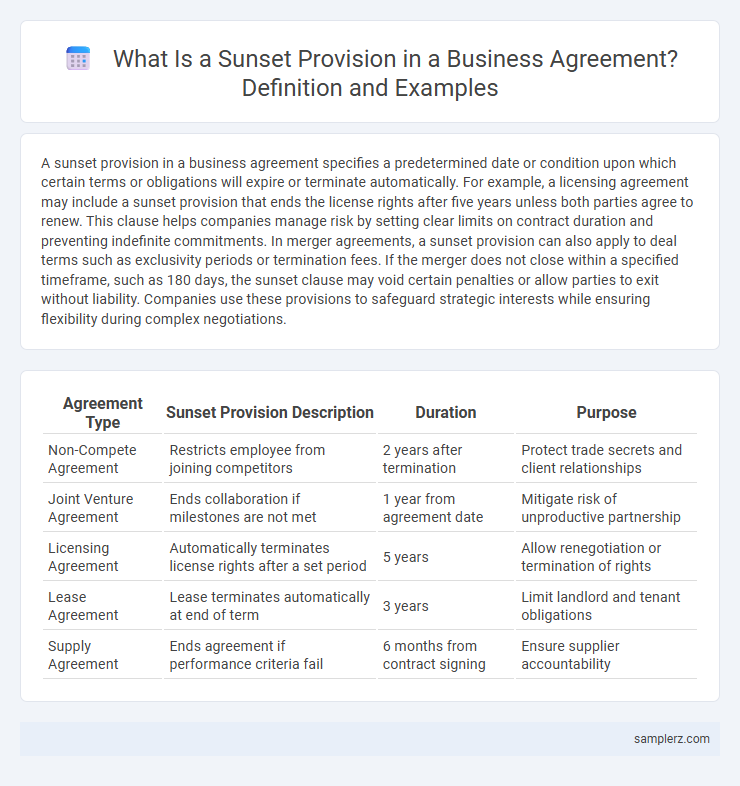A sunset provision in a business agreement specifies a predetermined date or condition upon which certain terms or obligations will expire or terminate automatically. For example, a licensing agreement may include a sunset provision that ends the license rights after five years unless both parties agree to renew. This clause helps companies manage risk by setting clear limits on contract duration and preventing indefinite commitments. In merger agreements, a sunset provision can also apply to deal terms such as exclusivity periods or termination fees. If the merger does not close within a specified timeframe, such as 180 days, the sunset clause may void certain penalties or allow parties to exit without liability. Companies use these provisions to safeguard strategic interests while ensuring flexibility during complex negotiations.
Table of Comparison
| Agreement Type | Sunset Provision Description | Duration | Purpose |
|---|---|---|---|
| Non-Compete Agreement | Restricts employee from joining competitors | 2 years after termination | Protect trade secrets and client relationships |
| Joint Venture Agreement | Ends collaboration if milestones are not met | 1 year from agreement date | Mitigate risk of unproductive partnership |
| Licensing Agreement | Automatically terminates license rights after a set period | 5 years | Allow renegotiation or termination of rights |
| Lease Agreement | Lease terminates automatically at end of term | 3 years | Limit landlord and tenant obligations |
| Supply Agreement | Ends agreement if performance criteria fail | 6 months from contract signing | Ensure supplier accountability |
Understanding Sunset Provisions in Business Agreements
Sunset provisions in business agreements specify a predetermined expiration date or condition upon which certain rights or obligations will terminate, ensuring clarity and limiting long-term uncertainties. For example, a shareholder agreement may include a sunset clause that ends a non-compete obligation five years after a shareholder exits the company. This mechanism protects parties by clearly defining the duration of specific commitments, facilitating smoother future negotiations and business transitions.
Key Features of Sunset Provisions Explained
Sunset provisions in business agreements specify a predetermined expiration date or condition under which certain contract terms automatically terminate, ensuring temporal clarity and risk management. Key features include clear activation criteria, defined duration, and automatic cessation to prevent indefinite obligations. These provisions enhance contract flexibility and provide built-in review mechanisms to adapt to changing business environments.
Common Scenarios for Including Sunset Provisions
Sunset provisions in business agreements commonly appear in joint venture contracts, where they set a predefined termination date to prevent indefinite obligations. They are also frequently included in licensing agreements to limit the duration of intellectual property usage rights. These provisions help manage risk by ensuring that agreements automatically expire if performance milestones or market conditions change significantly.
Real-World Example: Sunset Clause in Shareholder Agreements
A common real-world example of a sunset provision appears in shareholder agreements where certain rights or options, such as buyback rights or veto powers, automatically expire after a predetermined period, typically 5 to 10 years. This clause ensures shareholder remedies are time-bound, promoting exit strategies or restructuring without indefinite obligations. Such provisions help maintain clarity and incentivize timely decisions within evolving business partnerships.
Case Study: Sunset Provision in Joint Venture Contracts
A notable example of a sunset provision in joint venture contracts can be seen in the 2018 partnership between TechNova and GreenEnergy Solutions, where the agreement included a five-year termination clause to reassess project viability and intellectual property rights. This provision ensured an automatic dissolution of the joint venture unless both parties mutually agreed to extend the contract, safeguarding investments and encouraging periodic strategic evaluation. The sunset clause played a critical role in protecting stakeholders from prolonged financial exposure in a rapidly evolving renewable energy market.
Sunset Provisions in Licensing Agreements: An Illustration
Sunset provisions in licensing agreements specify a fixed termination date or condition for the license, ensuring that rights revert to the licensor after a certain period or event. For example, a technology license may include a sunset provision that ends the license five years after product launch or upon expiration of the underlying patent. This clause protects licensors by limiting indefinite use of their intellectual property and encourages licensees to innovate or renegotiate terms before expiration.
How Sunset Clauses Impact Non-Disclosure Agreements (NDAs)
Sunset provisions in Non-Disclosure Agreements (NDAs) define a specific duration for confidentiality obligations, ensuring sensitive information remains protected only for a relevant period. These clauses prevent indefinite secrecy, balancing protection with practical business timelines and promoting transparency in long-term partnerships. By limiting the lifespan of confidentiality, sunset clauses mitigate risks of outdated or unnecessary restrictions, facilitating smoother future negotiations and compliance.
Practical Example: Sunset Provision for Employment Contracts
A practical example of a sunset provision in employment contracts is a clause that automatically terminates non-compete agreements after a specified period, such as two years post-employment. This provision protects both employer and employee by limiting restrictions on future employment while providing clear legal boundaries. Sunset provisions ensure contractual obligations remain relevant and enforceable only within a reasonable timeframe, promoting fairness and workforce mobility.
Benefits and Risks of Sunset Clauses in Business Deals
Sunset provisions in business agreements automatically terminate contractual obligations after a specified period, providing clarity and preventing indefinite commitments. These clauses benefit businesses by reducing long-term liabilities and encouraging timely performance, but they also pose risks such as premature contract termination that may disrupt ongoing projects or partnerships. Careful drafting ensures sunset clauses balance risk management with operational continuity.
Best Practices for Drafting Sunset Provisions in Agreements
Drafting effective sunset provisions in business agreements involves clearly defining the expiration date or condition that triggers the provision's termination to avoid ambiguity and enforceability issues. Best practices include specifying measurable milestones, stating consequences upon expiration, and aligning the sunset clause with the overall business objectives to ensure seamless contract management. Including precise language and regular review mechanisms helps maintain relevance and adaptability to changing business environments.

example of sunset provision in agreement Infographic
 samplerz.com
samplerz.com